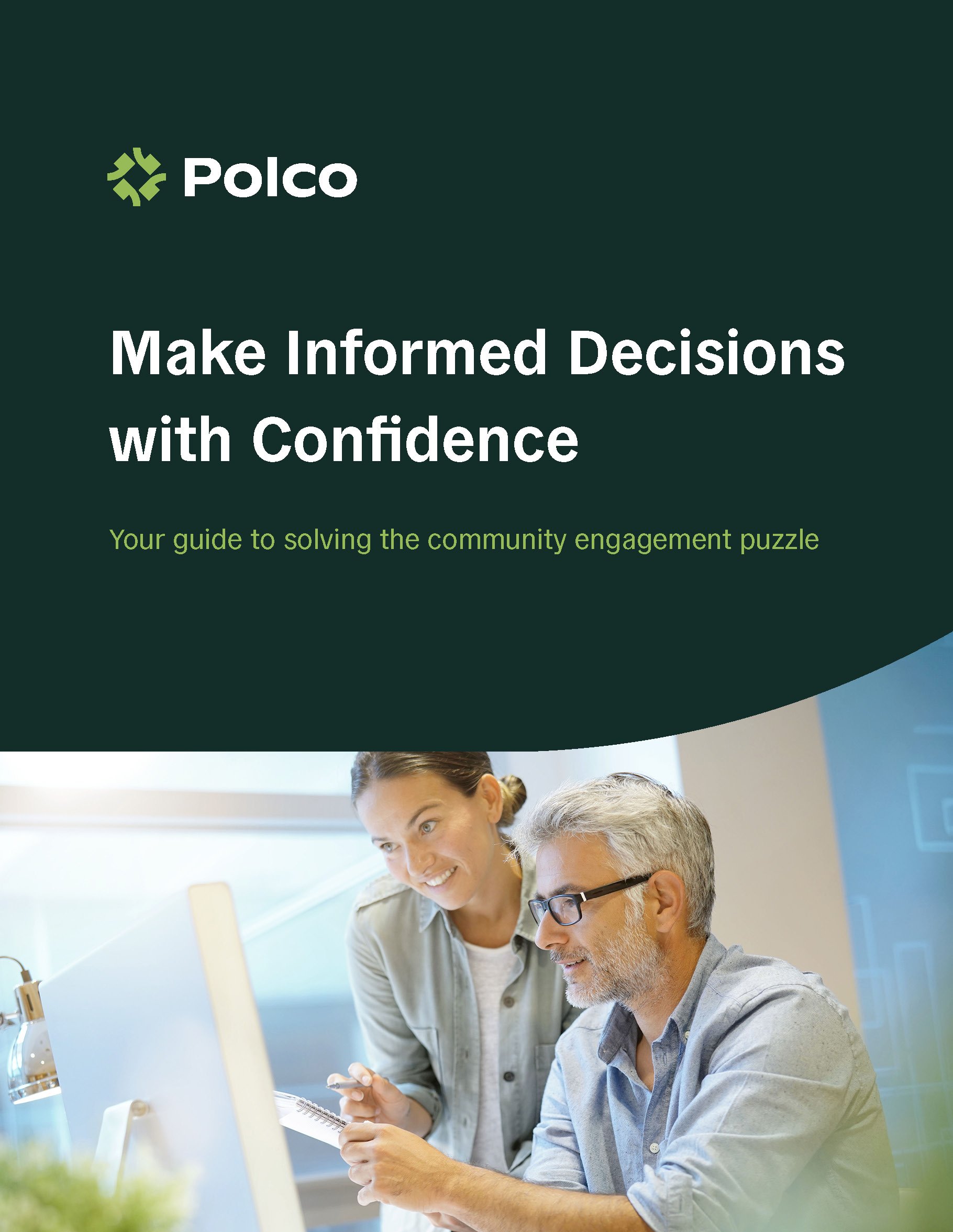Share this
AI in Government: A New Era of Data-Driven Decision-Making
by Polco on March 26, 2024

- By Angelica Wedell and Jessie O'Brien -
AI and its many uses has potential to revolutionize data-driven decision-making in local government.
The advent of Artificial Intelligence – AI – offers a game-changing opportunity for governments to transition into a data-driven era.
Even so, not everyone today is using AI for governance. We’ve all heard a lot about AI and how it will change everything. But some feel overwhelmed by having to learn a new technology. Some worry about unknown risks. Perhaps most are unclear about how to put AI to practical use.
Despite hesitancies, AI has the potential to spur some of the greatest innovations in the public sector, especially regarding leadership guided by big data.
AI can empower local governments to succeed in one of today’s most crucial strategies: adopting a data-driven philosophy.
The Untapped Goldmine for Government Decision-Making
Data-Driven Decision-Making (DDDM) describes using evidence to guide actions. This strategy has been the norm in the private sector for years.
Yet big data largely remains an untapped resource in the public sector. “About 40% of cities collect this data, but only a fraction actually uses it for performance management,” said David Swindell, director of the Center for Urban Innovation at Arizona State University, in a webinar about DDDM hosted by Polco.
Why the gap in evidence-based decision-making?
The sheer amount of data relevant for city leaders is astronomical compared to what private companies use for business growth. Moreover, most local government organizations have insufficient resources to tap into big data effectively. They often lack easy access to data, time for curating metrics, and staff analysts who can pinpoint key measures and report results in a useful way.
Furthermore, local governments have the added consideration of making resident opinions central to their data-driven strategies.
“We found that the engagement process is so critical in making better decisions,” said Kate Parmelee, deputy city manager for strategic initiatives and innovation and chief innovation officer at the City of Port St. Lucie, Florida. (The City uses The National Community Survey from Polco to collect public feedback, assess resident satisfaction, and track trends over time.)
“We do not have a team of data scientists — I wish we did — but we’re lucky we can partner with organizations like Polco and others to further accelerate our use of data,” Parmelee explained.
The bottom line is integrating a data-driven philosophy takes a lot of time and energy, even for the local governments that excel at it.
“Public officials earnestly want to make great decisions using data, but the DDDM shift is taking time because it requires a lot of effort,” said Nick Mastronardi, CEO of Polco, a community engagement and data analytics company.
Polco recently announced a new AI digital analyst technology poised to reduce cost, time, and effort burdens for local government organizations ready to maximize data in decisions.
This AI can instantly make sense of mountains of city data, generate reports, and write drafts in seconds. Ostensibly, this eliminates weeks of time traditionally spent on data collection and analysis.
Listen in to The Civil Review Podcast to hear Polco founders and VPs reveal Polly and explain how she was built.
How Polco’s AI Data Analyst Works
We know that sounds like a big claim. So how exactly can AI do this?
Generative AI systems (that create content) and large language models (that hold conversations) are trained on massive amounts of data. In Polco’s case, AI analyzes, makes correlations, and recognizes patterns to answer questions about a given jurisdiction accurately. (Polco’s AI data analyst is affectionately called Polly.)
Unlike other AI tools, Polly can only provide truthful, accurate results based on the government performance data it is fed.
That database is what makes it possible for AI to revolutionize government decision-making.
AI Trained on the Right Data Is a Game-Changer
Polly draws from Polco’s enormous proprietary database and consortium known as Government Performance Action & Learning (GPAL).
GPAL curates useful public data from the nation’s most trusted sources. Data scientists, academics, and local government experts envisioned GPAL to make data-driven decisions easier for public-sector leaders. Collaborators behind GPAL include National Research Center from Polco, the High Road Strategy Center at the University of Wisconsin-Madison, Hoover Institution at Stanford University, Arizona State University, the International City/County Management Association, the Government Finance Officers Association, and the Harvard Kennedy School of Government.
These experts hand-selected dozens of public datasets and thousands of indicators to best measure community quality of life, spanning 10 domains of livability (like safety, infrastructure, economy, and more). The data points come from national sources like the U.S. Census, the CDC, the FBI, and many more. Even resident voices are factored in. GPAL also incorporates results from The National Community Survey (exclusively provided by Polco) for participating jurisdictions.
Because Polco’s data analyst is trained on this wealth of information, local government officials can ask Polly questions about their community. The AI will respond instantly with accurate metrics and even reference the original data sources.
“It’s now imminently possible to unleash a public sector renaissance by putting world-class AI in the hands of nearly one million state and local government officials who haven’t previously had ready access to these datasets and analytics,” Mastronardi said.
How long did it last take you to compile metrics and create a report for the City Council? Imagine having an AI assistant crank out a data-rich draft for you in seconds. Think of the implications for streamlining strategic planning, improving budget allocation, justifying grant applications, and much more. The possibilities are profound.
In this way, AI offers a solution to the longstanding challenge of adopting a data-driven philosophy. Well-trained AI presents an opportunity to leverage vast amounts of data efficiently and effectively so local governments can unlock a wealth of actionable insights to inform policies and initiatives.
As we stand on the precipice of a new era, local governments must embrace AI as a catalyst for progress. We can’t wait to see how you navigate complex challenges with unprecedented clarity.
Stay Up-to-date on Polco's AI Data Analyst Release and Resources
Sign up for alerts on Polco's AI data analyst release dates. Get early access to educational articles, webinars, guides and essential resource on public-sector AI.
Related Articles
Share this
- News (154)
- Featured (140)
- Case Studies (98)
- Webinars (66)
- Resident Engagement (31)
- Budget and Finance (26)
- Simulation Tools (21)
- NCS (18)
- AI (14)
- CASOA (14)
- Balancing Act (12)
- Product Updates (12)
- Older Adults (11)
- Track (11)
- Benchmark Surveys (9)
- Taxpayer Receipt (9)
- Engagement & Outreach (8)
- About Polcos Product (7)
- Grants (7)
- Prioritize (6)
- Economic Growth (5)
- Public Safety (5)
- Housing (4)
- NBS (4)
- NES-LE (4)
- NLES (4)
- ARPA (3)
- About Polco (3)
- Announcements (2)
- NES (2)
- Understand Your Data (2)
- Best Practices (1)
- CLS (1)
Subscribe to Our Newsletter

Featured Report
Download your copy of "Make Informed Decisions with Confidence: Solving The Community Engagement Puzzle" today!
You May Also Like
These Related Stories

Beyond Retirement: How Older Adults Are Seeking New Purpose Through Work

Local Governments Can Harness AI for Good

